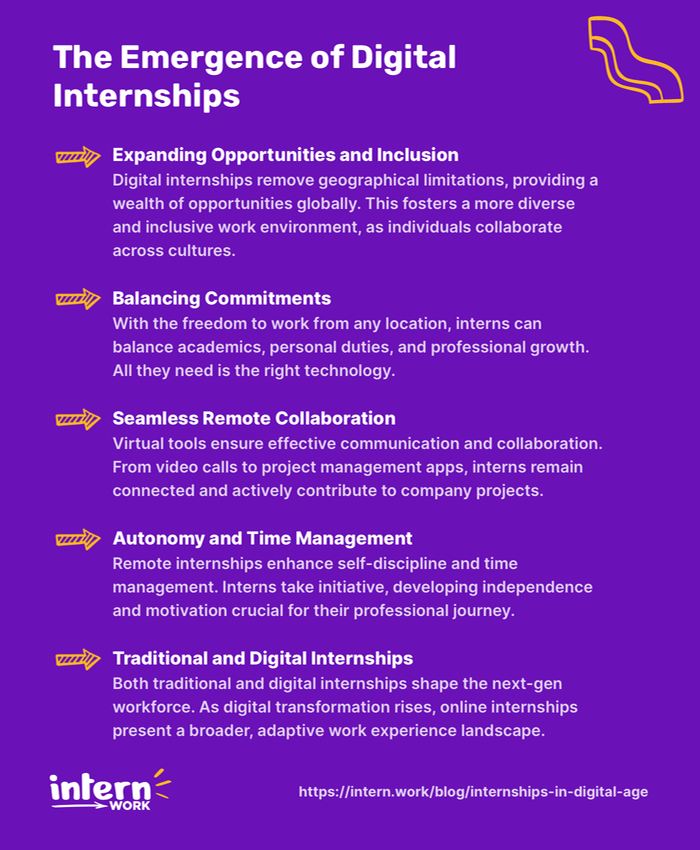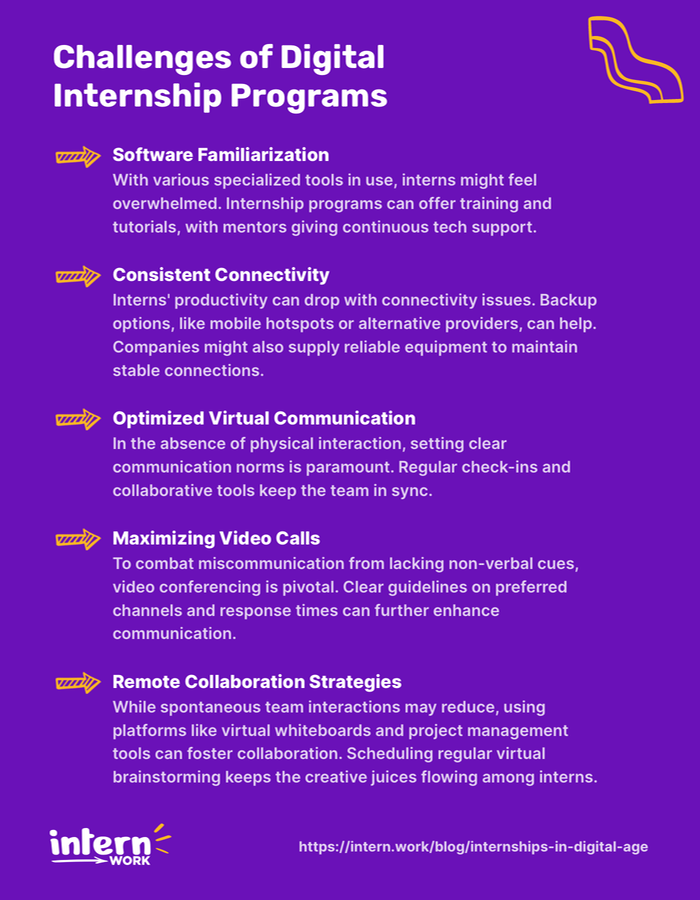
Internship programs have come a long way since their inception. In the digital age, where technology reigns supreme, internships have also transformed remarkably. What was once a conventional way of gaining work experience has become a digital playground for aspiring professionals. In this article, we’ll explore the concept of internships, delve into the impact of digitalization on internship programs, examine the benefits and challenges of digital internships, and discuss case studies and future predictions. So grab your virtual briefcase, and let’s dive in!
Understanding the Concept of Internships
Internships have long been integral to the journey toward a successful career. These programs allow students and young professionals to gain practical experience in their chosen fields. Traditionally, internships involved working in physical offices and engaging in tasks and projects under the guidance of experienced professionals. However, the rise of the digital age has revolutionized internships, giving birth to a new era of virtual opportunities.
Internships are more than just a resume booster; they are a stepping stone toward professional growth and development. By participating in internships, individuals can apply the theoretical knowledge acquired in classrooms to real-world scenarios. This hands-on experience allows them to understand the intricacies of their chosen field, build essential skills, and gain insights into industry practices.
Traditional Internship Programs: An Overview
Traditional internship programs have been the foundation of work experience for decades. They typically involve working on-site, being physically present in an office environment, and immersing oneself in the daily operations of a company. Interns would shadow mentors, contribute to projects, and learn from their colleagues. These internships offered valuable insights into the industry, allowing interns to develop crucial skills and expand their professional networks.
During traditional internships, interns learn technical skills and develop critical soft skills such as communication, teamwork, and time management. They witness firsthand how professionals navigate challenges, collaborate with others, and make decisions in a fast-paced work environment. Moreover, interns have the opportunity to establish professional connections that may prove valuable in their future careers.
While traditional internships remain relevant today, digitalization has opened up a world of possibilities for a remote workforce. Enter the realm of digital internships.
The Emergence of Digital Internships
With the advent of technology and the rise of remote work, internships have transformed into digital counterparts. Digital internships offer an innovative approach to gaining work experience by leveraging the power of the internet and virtual collaboration tools. They provide flexibility, accessibility, and a unique blend of independence and guidance.
-
Expanding Opportunities and Inclusion
Thanks to digital internships, aspiring professionals can now work with companies worldwide without being physically present in an office. This has expanded the pool of opportunities and fostered diversity and inclusion in the workplace. Digital internships break down geographical barriers, allowing individuals to collaborate with professionals from different cultures, backgrounds, and perspectives.
-
Balancing Commitments
Moreover, digital internships provide a flexible working environment, enabling interns to balance their academic commitments, personal responsibilities, and professional aspirations. Interns can work from the comfort of their homes or any location of their choice if they can access the necessary technology and resources.
-
Seamless Remote Collaboration
Virtual collaboration tools have become the backbone of digital internships. These tools facilitate communication, project management, and remote teamwork, ensuring interns can actively participate in the company’s operations and contribute meaningfully to projects. Through video conferences, instant messaging platforms, and project management software, interns can interact with their mentors, seek guidance, and collaborate with team members seamlessly.
-
Autonomy and Time Management
Furthermore, digital internships offer a unique opportunity for individuals to develop self-discipline and time management skills. As interns are not physically supervised, they must take ownership of their work and manage their time effectively to meet deadlines and deliver high-quality results. This level of autonomy fosters independence and self-motivation, which are highly valued in the professional world.
-
Traditional and Digital Internships
Internships, whether traditional or digital, play a vital role in shaping the future workforce. They provide individuals with the platform to gain practical experience, develop crucial skills, and build professional networks. As the world continues to embrace digitalization, digital internships offer a new dimension to work experience, allowing individuals to explore opportunities beyond geographical boundaries and adapt to the evolving nature of work.

Digital internships have revolutionized work experience. They provide expanded opportunities, foster diversity, and promote flexibility. Through virtual collaboration tools, interns can collaborate seamlessly and develop autonomy and time management skills.
The Impact of Digitalization on Internship Programs
The digital age has brought about significant changes in various aspects of our lives, and internships are no exception. Let’s explore how digitalization has revolutionized internship programs and the benefits it brings to the table.
The Shift from Traditional to Digital Internships
The shift from traditional to digital internships reflects the changing landscape of work. Companies increasingly embrace remote and flexible work arrangements, which naturally extend to internship programs. Digital internships offer the chance to work with cutting-edge technology, collaborate with diverse teams, and gain exposure to global markets—all from the comfort of one’s home.
Moreover, digital internships allow individuals to explore different industries and sectors without the constraints of geographical location. For instance, a student based in a small town can now intern for a tech startup in Silicon Valley, broadening their horizons and expanding their network.
Furthermore, digital internships allow individuals to develop valuable skills in remote teamwork, project management, and online communication—essential competencies in today’s digital economy. Interns learn to navigate virtual workspaces, adapt to different time zones, and effectively collaborate with colleagues from diverse cultural backgrounds.
The Role of Technology in Internship Transformation
Technology plays a crucial role in the transformation of internship programs. Digital internships utilize many tools and platforms that enable seamless collaboration and efficient project management. From video conferencing and instant messaging to project management software, interns have the digital arsenal to excel in their roles.
Moreover, technology facilitates mentorship and knowledge transfer, allowing interns to learn from experienced professionals regardless of geographical limitations. Through virtual mentorship programs, interns can connect with industry experts worldwide, gaining valuable insights and guidance.
The digital landscape has become a treasure trove of resources, and digital internships tap into that wealth. Interns can access online learning platforms, webinars, and industry-specific forums, enhancing their knowledge and skill set. They can stay updated with the latest trends and developments in their field, ensuring they are well-prepared for future career opportunities.
Additionally, digitalization has opened doors for internships in emerging fields such as artificial intelligence, virtual reality, and blockchain. These cutting-edge technologies require specialized skills, and digital internships provide a platform for individuals to acquire and apply these skills in real-world scenarios.
The Future of Digital Internships
As digitalization continues to reshape the world of work, the future of digital internships looks promising. Companies are recognizing the benefits of remote work. They are likely to continue offering digital internship opportunities even after the pandemic subsides.
Furthermore, technological advancements, such as augmented reality and machine learning, will further enhance the digital internship experience. Interns may be able to work on groundbreaking projects, leveraging these technologies to drive innovation and make a meaningful impact.
In conclusion, digitalization has revolutionized internship programs, allowing individuals to gain valuable skills, collaborate globally, and explore diverse industries. Technology has become integral to internship transformation, facilitating seamless communication and knowledge transfer. As we move forward, digital internships will continue to evolve, shaping the future of work and providing exciting opportunities for aspiring professionals.
Digitalization has revolutionized internships, offering flexibility, global collaboration, and access to cutting-edge technology. As digitalization progresses, internships continue to evolve, shaping the future of work.
Benefits of Digital Internship Programs
Digital internships offer a wide range of benefits, making them an attractive option for interns and organizations. Let’s explore some of these advantages.
Accessibility and Flexibility of Digital Internships
One of the most significant advantages of digital internships is their accessibility. Geographical barriers are virtually eliminated, widening opportunities for aspiring professionals. Interns no longer have to worry about relocation costs or visa restrictions—they can connect with companies from anywhere in the world.
Furthermore, digital internships offer flexibility that traditional internships cannot match. Interns can create schedules, work from their preferred location, and balance their professional and personal commitments more effectively. It’s the epitome of work-life integration.
Imagine a talented student from a small town who dreams of interning at a prestigious tech company in Silicon Valley. In the past, this dream might have been hindered by the high cost of living and the challenges of securing a visa. However, with digital internships, this student can now pursue their dreams without geographical limitations. They can work remotely from their home, connecting with industry professionals and gaining valuable experience.
Additionally, the flexibility of digital internships allows interns to explore other interests and commitments alongside their professional development. They can take on part-time jobs, engage in volunteer work, or even pursue further education—all while gaining practical experience in their chosen field. This flexibility enhances their skills and makes them more well-rounded individuals.
Skill Development in the Digital Age
The digital age brings with it a demand for specific skills that can drive success in the modern workplace. Digital internships offer the perfect platform for individuals to develop and hone these skills. From digital marketing and data analysis to coding and content creation, interns can gain practical experience in highly sought-after fields.
Take, for example, a student majoring in digital marketing. Through a digital internship, they can work alongside experienced professionals, learning the ins and outs of search engine optimization, social media management, and online advertising. They can apply their theoretical knowledge to real-world scenarios, gaining a deeper understanding of the industry and building a solid foundation for their future career.
Moreover, digital internships foster adaptability and resourcefulness. Working remotely requires individuals to be self-motivated, proactive, and adept at problem-solving. These skills are invaluable in today’s fast-paced and ever-changing work environment. Interns learn to navigate virtual collaboration tools, communicate effectively across different time zones, and adapt to new technologies and workflows. These experiences enhance their technical skills and equip them with the mindset to thrive in the digital age.
Furthermore, the digital nature of these internships allows interns to explore emerging technologies and trends. They can work with cutting-edge tools and software, gaining hands-on experience with the latest innovations in their respective fields. This exposure gives them a competitive edge and prepares them for challenges and opportunities.
As the world becomes increasingly interconnected and technology-driven, digital internships are integral to professional development. They offer accessibility, flexibility, and skill development opportunities that are highly valuable in today’s job market. Whether you’re a student seeking practical experience or an organization seeking fresh talent, digital internships present a win-win scenario for all parties involved.
Digital internships offer accessibility, flexibility, and skill development in high-demand fields. They foster adaptability and exposure to emerging technologies, benefiting interns and organizations.
Challenges of Digital Internship Programs
While digital internships have numerous advantages, they also come with their own set of challenges. Let’s look at these obstacles and how they can be overcome.
-
Overcoming Technological Barriers
Digital internships heavily rely on technology, and as with any technological endeavor, technical issues can arise. From unstable internet connections to software compatibility problems, interns may encounter obstacles that hinder their productivity. Overcoming these barriers requires a proactive approach, such as ensuring reliable internet access, regularly updating software, and having contingency plans.
-
Navigating Unfamiliar Tools
One common technological barrier digital interns face is working with different software applications. Depending on the nature of the internship, interns may need to use specialized software or tools that they are unfamiliar with. This can lead to a steep learning curve and potential setbacks in their work. To address this, internship programs can provide training sessions or online tutorials to familiarize interns with the required software. Additionally, mentors can offer ongoing support and guidance to help interns navigate technical challenges.
-
Ensuring Stable Internet Access
Another technological challenge is the potential for connectivity issues. Digital internships often involve remote work, which means interns rely on stable internet connections to communicate, access files, and collaborate with their teams. However, internet outages or slow connections can disrupt workflow and hinder productivity. To mitigate this, interns can be encouraged to have backup internet options, such as a mobile hotspot or a secondary internet provider. Employers can also consider providing interns with the necessary equipment, such as a reliable router or a company-issued laptop, to ensure consistent connectivity.
-
Addressing Virtual Challenges
Effective communication and collaboration are crucial for the success of any internship program. In a digital setting, interns and mentors must navigate virtual communication channels and ensure that information flows smoothly. Clear expectations, regular check-ins, and the use of collaborative tools can facilitate effective communication and foster a sense of camaraderie among team members.
-
Utilizing Video Conferencing
One challenge in digital internships is the potential for miscommunication or misunderstanding due to the lack of face-to-face interaction. Non-verbal cues and body language play a significant role in communication. With them, interns may be able to interpret messages accurately. To address this, internship programs can encourage interns and mentors to utilize video conferencing tools for essential discussions or meetings. Video calls can bridge the gap and provide a more personal and interactive communication experience. Additionally, establishing clear communication guidelines, such as preferred communication channels and response time expectations, can help minimize misunderstandings and ensure efficient information exchange.
-
Collaboration in a Remote Setting
Collaboration is another aspect that can be challenging in digital internships. Working remotely can make it difficult for interns to engage in spontaneous brainstorming sessions or impromptu discussions. However, effective collaboration can still be achieved with the right tools and strategies. Internship programs can encourage collaborative platforms, such as project management software or virtual whiteboards, to facilitate teamwork and idea sharing. Regular virtual team meetings or brainstorming sessions can also be scheduled to allow interns to collaborate and bounce ideas off each other.

Digital internships have challenges like technological barriers, stable internet access, virtual communication, and remote collaboration. These can be addressed through training, backup options, video conferencing, and collaborative platforms.
The Future of Internship Programs in the Digital Age
As we look ahead, it’s clear that the digital age will continue to shape internship programs. Let’s explore some predicted trends and how individuals can prepare for a digital-first internship future.
Predicted Trends for Digital Internships
The future of digital internships is promising. We expect to see an increase in cross-border collaborations, the rise of virtual mentorship programs, and the integration of cutting-edge technologies into internship curricula. Artificial intelligence, virtual reality, and augmented reality are just a few examples of technologies that have the potential to redefine the internship experience.
Preparing for a Digital-First Internship Future
Aspiring professionals can prepare for a digital-first internship future by embracing technological advancements, upskilling in digital competencies, and maintaining a flexible mindset. Adapting to a digital work environment and being open to new opportunities will be essential in thriving in the internships of tomorrow.
The future of digital internships looks promising with cross-border collaborations, virtual mentorship programs, and cutting-edge technologies. Aspiring professionals should embrace technology, upskill in digital competencies, and maintain a flexible mindset to prepare for this digital-first future.
Key Takeaways
- The concept of internships has evolved in the digital age, providing virtual opportunities for aspiring professionals to gain practical experience in their chosen fields.
- Traditional internships involve on-site work in physical offices. In contrast, digital internships leverage technology and virtual collaboration tools to offer flexibility, accessibility, and independence.
- Digital internships foster autonomy, time management skills, and self-discipline, preparing individuals for the professional world.
- Technology is crucial in transforming internship programs, facilitating collaboration, mentorship, and access to online learning platforms.
- Digital internships offer accessibility, flexibility, and skill development opportunities, allowing interns to gain practical experience in high-demand fields and explore emerging technologies.
- Challenges of digital internships include technological barriers, unfamiliarity with software applications, stable internet access, effective communication, and remote collaboration.
- Aspiring professionals can prepare for a digital-first internship future by embracing technology, developing digital competencies, and maintaining a flexible mindset.
Wrapping Up
Internship programs have evolved significantly in the digital age. The shift from traditional to digital internships has opened opportunities for aspiring professionals, offering accessibility, flexibility, and valuable skill development. While digital internships come with challenges, they are undoubtedly the way forward in a world increasingly driven by technology. By examining case studies and future predictions, we can see that the future of internship programs is bright and exciting. So, embrace the digital realm and embark on your journey toward a successful career!






